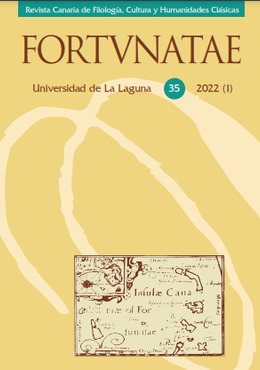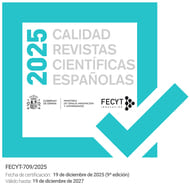Los médicos en la historiografía latina: discursos, representaciones y funciones narrativas desde los orígenes hasta Quinto Curcio Rufo
Resumen
Los prejuicios de los romanos contra los médicos y la medicina griega, que pueden encontrarse a lo largo de la literatura latina desde el siglo II a.C., se manifestaron también en la historiografía latina. El estudio de un corpus de textos históricos indica que, en ellos, los médicos tienden a ser representados como personajes malvados e intrigantes. Sin embargo, las Historiae de Curcio marcan un cambio radical en esta representación: para demostrarlo, se analiza desde un punto de vista narratológico e intertextual el pasaje de la curación de Alejandro tras recibir una herida en India (Curt. 9.5.22-30).
Citas
ALONSO, M. A. (2018): «Greek Physicians in the Eyes of the Roman Elite (from the Republic to the 1st Century AD)», Annales UMCS Sec. F 73: 119-137. DOI <http://dx.doi.org/10.17951/f.2018.73.119-137>.
APRILE, G. (2018): Aperiat oculus ad hoc spectaculum Dareus!: Espectáculo, visualidad y escenificación en las Historiae de Q. Curcio [Tesis doctoral], Universidad de Salamanca. DOI https://doi.org/10.14201/gredos.139476>.
ATKINSON, J. E. (1980): A Commentary on Q. Curtius Rufus’ Historiae Alexandri Magni Books 3 and 4, J. C. Gieben, Amsterdam.
BAL, M. (1990): Teoría de la narrativa. Una introducción a la narratología, Cátedra, Madrid.
BAYNHAM, E. (1998): Alexander the Great. The Unique History of Quintus Curtius, University of Michigan Press, Ann Arbor.
BOSCHERINI, S. (1993): «La medicina in Catone e Varrone», en HAASE, W. & TEMPORINI, H. (eds.), ANRW II 37.1, pp. 792-755.
BOSWORTH, A. B. (1996): Alexander and the East. The Tragedy of Triumph, Oxford University Press, Oxford.
CHAPLIN, J. D. (2000): Livy’s Exemplary History, Oxford University Press, Oxford - New York.
FERNÁNDEZ CORTE, J. C. (1999): «Ficción en la Historia Alexandri de Quinto Curcio Rufo: La anécdota del médico Filipo en comparación con Arriano y Plutarco», Exemplaria 3: 1-15.
GENETTE, G. (1972): Figures III, Éditions du Seuil, Paris.
GERVAIS, A. (1964): «Que pensait-on des médecins dans l’ancienne Rome ?», BAGB 1(2), 197-231. DOI <https://doi.org/10.3406/bude.1964.4072>.
GOUREVITCH, D. (1984): Le triangle hippocratique dans le monde gréco-romain. Le malade, sa maladie et son médecin, École française de Rome, Rome. DOI <https://doi.org/10.3406/befar.1984.1211>.
GRUEN, E. (2011): Rethinking the Other in Antiquity, Princeton University Press, Princeton - Oxford.
HECKEL, W. (2006): Who’s Who in the Age of Alexander the Great. Prosopography of Alexander’s Empire, Blackwell, Malden - Oxford - Carlton.
JAHN, M. (1996): «Windows of Focalization: Deconstructing and Reconstructing a Narratological Concept», Style 30.2: 241-267.
KUDLIEN, F. (1986): Die Stellung des Arztes in der römischen Gesellschaft, Franz Steiner Verlag, Stuttgart.
LEVENE, D. S. (2007): «Roman Historiography in the Late Republic», en MARINCOLA, J. (ed.), A Companion to Greek and Roman Historiography, Blackwell, Malden - Oxford, pp. 275-289. DOI <https://doi.org/10.1002/9781405185110.ch23>.
MACHEREI, A. (2012): Medizinisches bei Quintus Curtius Rufus Historiarum Alexandri Magni Macedonis libri qui supersunt [Diss.], Universität Bochum. <https://hss-opus.ub.ruhr-uni-bochum.de/opus4/frontdoor/index/index/docId/3747>.
MACHEREI, A. (2016): «Die Medizin in Curtius’ Tarsos-und Mallerstadt-Episode», en WULFRAM, H. (ed.), Der römischer Alexanderhistoriker Curtius Rufus: Erzähltechnik, Rhetorik, Figurenpsychologie und Rezeption, Österreichische Akademie der Wissenschaften, Wien, pp. 219-237.
NUTTON, V. (2004): Ancient Medicine, Routledge, Oxford - New York.
PELLING, C. B. R. (1999): «Cassius Hemina, Lucius», en HORNBLOWER, S. & SPAWFORTH, A. (eds.), The Oxford Classical Dictionary. Third Edition, Oxford University Press, Oxford, p. 300.
SCHULZE, C. (2016): «Der Arzt bei Curtius Rufus. Medizinische und literarische Funktionen», en WULFRAM, H. (ed.), Der römischer Alexanderhistoriker Curtius Rufus: Erzähltechnik, Rhetorik, Figurenpsychologie und Rezeption, Österreichische Akademie der Wissenschaften, Wien, pp. 209-217.
WALKER, A.D. (1993): «Enargeia and the Spectator in Greek Historiography», TAPA 123: 353-377. DOI <https://doi.org/10.2307/284335>.
Los autores conservan los derechos de autor y garantizan a la revista el derecho de ser la primera publicación del trabajo al igual que licenciarlo bajo una Creative Commons Attribution License que permite a otros compartir el trabajo con un reconocimiento de la autoría del trabajo y la publicación inicial en esta revista.
Los autores pueden establecer por separado acuerdos adicionales para la distribución no exclusiva de la versión de la obra publicada en la revista (por ejemplo, situarlo en un repositorio institucional o publicarlo en un libro), con un reconocimiento de su publicación inicial en esta revista.






